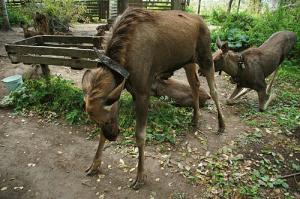Baby Moose Makes a Stand
Its fix typo and a little programming day here in the Moose-Pen.
Before I get back on track and start working on test case '32_params.t' but before that I had to clean-up in my code. Seems I had 'parenthes' all over the place when it should really be 'parentheses' so the last thin I did last night was clean all those up. Thank goodness for Padre and it search and replace functions.
Anyway on to '32_params.t' and the fist thing I did was cut out some tests from other places and put them in there as it made a little more logical sense. From 20_where_basic.t I striped out all the tests that check params and ended with these tests;
$da->create( $utils->connect(),$container);
cmp_deeply(
$da->result()->params,
[qw(Bill Bloggings)],
"create params in correct order"
);
$da->retrieve( $utils->connect() );
cmp_deeply(
$da->result()->params,
[qw(test1 test2)],
"retrieve params in correct order"
);
$da->update( $utils->connect(),$container);
cmp_deeply(
$da->result()->params,
[qw(Bill Bloggings test1 test2)],
"update params in correct order"
);
$da->delete( $utils->connect());
cmp_deeply(
$da->result()->params,
[qw(test1 test2)],
"delete params in correct order"
);
and on my first run I get;
not ok 1 - create params in correct order
ok 2 - retrieve params in correct order
not ok 3 - update params in correct order
ok 4 - delete params in correct order
so I guess I have muddled something up over the past few days!
Well with that handy 'da_warning' flag set nice and high, I see that my SQL is coming out of the Create is
INSERT INTO people ( people.last_name ) VALUES( ? )
and given the above I did a quick run of the other tests cases and most deal fail. Time to nip that one in the bud.
Now after a good bit of blundering about I discovered that this was my bug;
my $in_hash = {
da_compose_only=>1,
view => { name => 'people' },
elements => [
{
name => 'first_name',
-- view => 'People'
++ view => 'people'
},
{
...
so a simple capitalization error. Now this may or may not be a problem, some dbs like Mongo are very very case sensitive as
use dev_db;
and
use Dev_DB;
are separate DBs and depending on where you do that 'use' you could be creating a new DB.
Others like Oracle can be or cannot be, I sure we have all run into an SQL like this
select user_name from “User”
Now I am playing with Accessor.pm correctly, as I am running into this rule
next
if (
(
$element->view ne $self->view->name
and $element->view ne $self->view->alias
)
and ( $action eq Database::Accessor::Constants::CREATE
or $action eq Database::Accessor::Constants::UPDATE )
);
from the get_dad_elements sub;
This does beg the question of what should I do for two SQL statements
INSERT INTO people ( people.first_name, people.last_name ) VALUES( ?, ? )
INSERT INTO people ( People.first_name, people.last_name ) VALUES( ?, ? )
on 99.9 of the RBDMS out there they should return the same results;
If I was Mongo or most other key data stores this would be the query
$people->insert_one( {
"first_name" => ?,
"last_name" => ?,
});
$People->insert_one( {
"first_name" => ?,
"last_name" => ?,
});
which would effect two separate collections on the data-store, not a good thing.
I was thinking maybe some sort of flag to set UC or LC off but that would only result in Database::Accessor running fine on one combination of DB and DAD and then buggering up on another combination.
The whole idea is to have a neutral platform so for now I will leave as it but I will put a big section in the POD on the importance of proper capitalization.

 Long time Perl guy, a few CPAN mods allot of work on DBD::Oracle and a few YAPC presentations
Long time Perl guy, a few CPAN mods allot of work on DBD::Oracle and a few YAPC presentations
Leave a comment